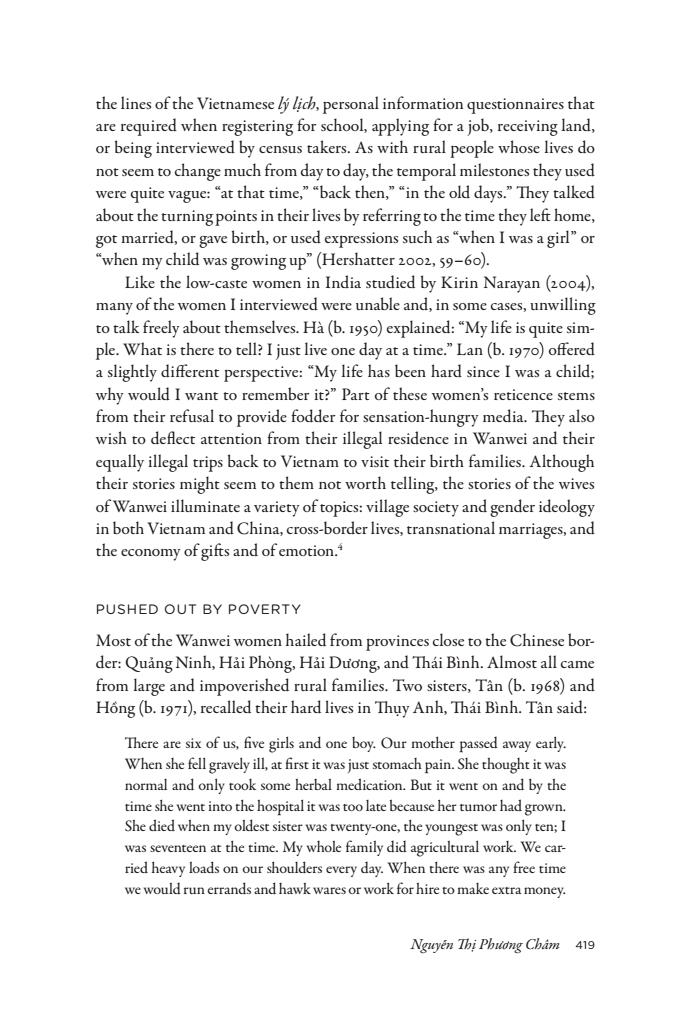正在加载图片...

the lines of the Vietnamesely lich,personal information questionnaires that are required when registering for school,applying for a job,receiving land, or being interviewed by census takers.As with rural people whose lives do not seem to change much from day to day,the temporal milestones they used were quite vague::“at that time,”“back then,"“in the old days."They talked about the turningpoints in their lives by referring to the time they left home, got married,or gave birth,or used expressions such as"when I was a girl"or 'when my child was growing up"(Hershatter 2002,59-60). Like the low-caste women in India studied by Kirin Narayan (2004), many of the women I interviewed were unable and,in some cases,unwilling to talk freely about themselves.Ha(b.19so)explained:"My life is quite sim- ple.What is there to tell?I just live one day at a time."Lan(b.197o)offered a slightly different perspective:"My life has been hard since I was a child; why would I want to remember it?"Part of these women's reticence stems from their refusal to provide fodder for sensation-hungry media.They also wish to deflect attention from their illegal residence in Wanwei and their equally illegal trips back to Vietnam to visit their birth families.Although their stories might seem to them not worth telling,the stories of the wives of Wanwei illuminate a variety of topics:village society and gender ideology in both Vietnam and China,cross-border lives,transnational marriages,and the economy of gifts and of emotion. PUSHED OUT BY POVERTY Most of the Wanwei women hailed from provinces close to the Chinese bor- der:Quang Ninh,Hai Phong,Hai Duong,and Thai Binh.Almost all came from large and impoverished rural families.Two sisters,Tan(b.1968)and Hong(b.1971),recalled their hard lives in Thuy Anh,Thai Binh.Tan said: There are six of us,five girls and one boy.Our mother passed away early. When she fell gravely ill,at first it was just stomach pain.She thought it was normal and only took some herbal medication.But it went on and by the time she went into the hospital it was too late because her tumor had grown. She died when my oldest sister was twenty-one,the youngest was only ten;I was seventeen at the time.My whole family did agricultural work.We car- ried heavy loads on our shoulders every day.When there was any free time we would run errands and hawk wares or work for hire to make extra money. Nguyen Thi Phuldng Cham 419Nguyễn Thị Phương Châm ùõþ the lines of the Vietnamese lý lịch, personal information questionnaires that are required when registering for school, applying for a job, receiving land, or being interviewed by census takers. As with rural people whose lives do not seem to change much from day to day, the temporal milestones they used were quite vague: “at that time,” “back then,” “in the old days.” They talked about the turning points in their lives by referring to the time they left home, got married, or gave birth, or used expressions such as “when I was a girl” or “when my child was growing up” (Hershatter 2002, 59–60). Like the low-caste women in India studied by Kirin Narayan (2004), many of the women I interviewed were unable and, in some cases, unwilling to talk freely about themselves. Hà (b. 1950) explained: “My life is quite simple. What is there to tell? I just live one day at a time.” Lan (b. 1970) offered a slightly different perspective: “My life has been hard since I was a child; why would I want to remember it?” Part of these women’s reticence stems from their refusal to provide fodder for sensation-hungry media. They also wish to deflect attention from their illegal residence in Wanwei and their equally illegal trips back to Vietnam to visit their birth families. Although their stories might seem to them not worth telling, the stories of the wives of Wanwei illuminate a variety of topics: village society and gender ideology in both Vietnam and China, cross-border lives, transnational marriages, and the economy of gifts and of emotion.4 ŗŗŗ Most of the Wanwei women hailed from provinces close to the Chinese border: Quảng Ninh, Hải Phòng, Hải Dương, and Thái Bình. Almost all came from large and impoverished rural families. Two sisters, Tân (b. 1968) and Hồng (b. 1971), recalled their hard lives in Thụy Anh, Thái Bình. Tân said: There are six of us, five girls and one boy. Our mother passed away early. When she fell gravely ill, at first it was just stomach pain. She thought it was normal and only took some herbal medication. But it went on and by the time she went into the hospital it was too late because her tumor had grown. She died when my oldest sister was twenty-one, the youngest was only ten; I was seventeen at the time. My whole family did agricultural work. We carried heavy loads on our shoulders every day. When there was any free time we would run errands and hawk wares or work for hire to make extra money.�